Build an Alerting Workflow with PagerDuty and Orkes Conductor
In this tutorial, you’ll build an alerting workflow using Orkes Conductor and PagerDuty. The workflow periodically checks for failed workflows and sends alerts to on-call engineers when failures are detected.
This pattern mirrors real-world operational monitoring, where automated polling detects issues and immediately notifies the team responsible for resolution.
The alerting workflow
In this tutorial, you’ll build an alerting system with Conductor workflows and PagerDuty, where:
- A Query Processor task checks for failed workflows within a defined time window.
- A Switch task that evaluates the number of failed workflows and determines whether to trigger a PagerDuty alert.
- If failures exist, the workflow triggers a PagerDuty alert.
- If no failures are found, the workflow completes silently.
Here’s how the workflow looks like:
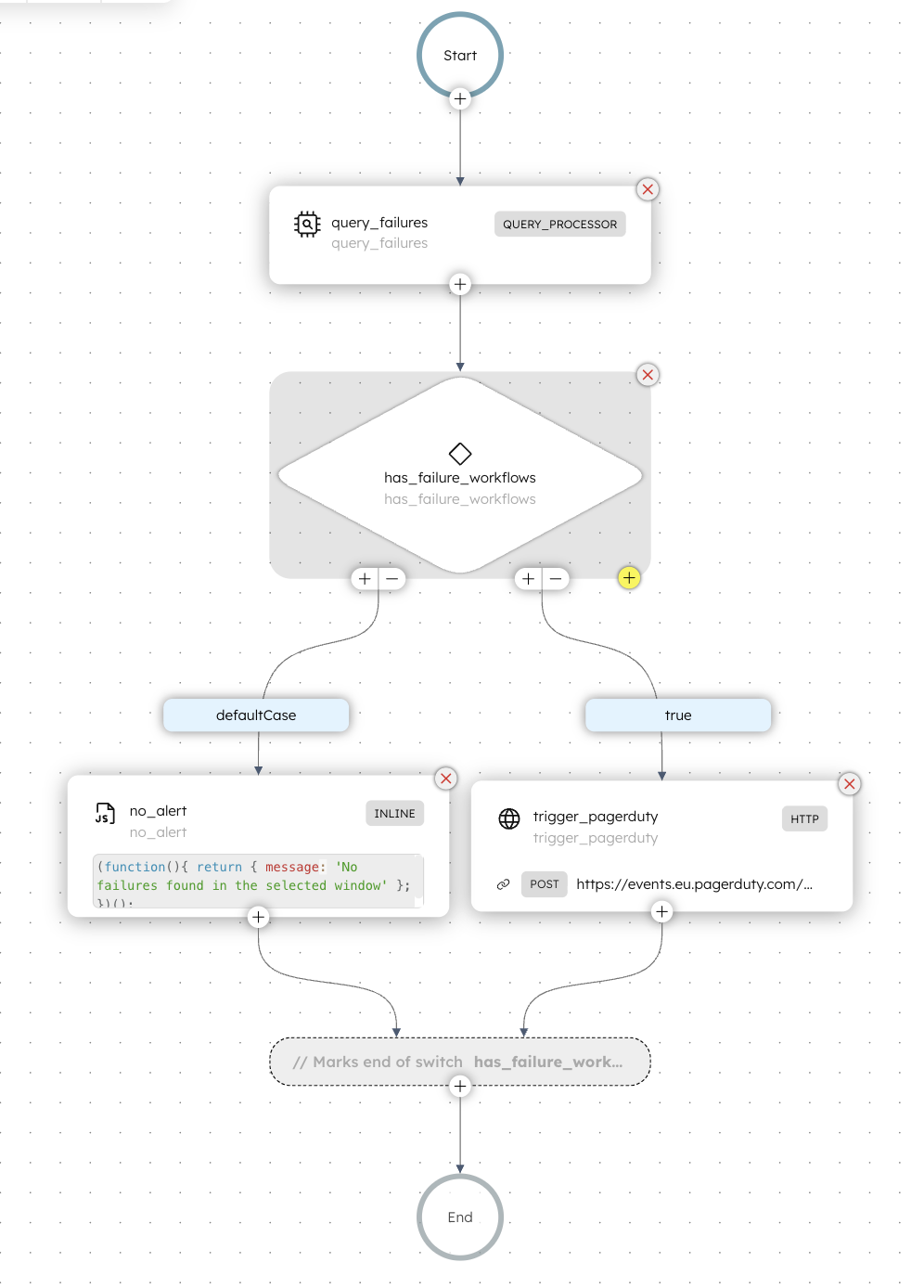
Follow along using the free Orkes Developer Edition. If you don’t have an account yet, sign up to get started.
Step 1: Create workflows in Orkes Conductor
Orkes Conductor lets you define workflows as JSON, through SDKs, APIs, or the UI.
In this tutorial, you will create two workflows:
- seed_failure: A workflow that intentionally fails on each run, used to simulate a failure event.
- alert_workflow: A workflow that monitors the first one for failures and triggers a PagerDuty alert.
To create a workflow using Conductor UI:
- Go to Definitions > Workflow from the left navigation menu on your Conductor cluster.
- Select + Define workflow.
- In the Code tab, paste the following code:
{
"name": "seed_failure",
"description": "Intentionally fails for alert testing",
"version": 1,
"tasks": [
{
"name": "force_error",
"taskReferenceName": "force_error",
"inputParameters": {
"evaluatorType": "graaljs",
"expression": "(function(){ throw new Error('Intentional failure for alert test'); })();"
},
"type": "INLINE"
}
],
"schemaVersion": 2
}
- Select Save > Confirm.
Next, repeat the steps and create the alerting workflow using the following code:
{
"name": "alert_workflow",
"description": "Track workflow failures and trigger a PagerDuty alert.",
"version": 1,
"tasks": [
{
"name": "query_failures",
"taskReferenceName": "query_failures",
"inputParameters": {
"queryType": "CONDUCTOR_API",
"workflowNames": [
"seed_failure"
],
"statuses": [
"FAILED"
],
"startTimeFrom": "${workflow.input.nowMinusStartMinutes}",
"startTimeTo": "${workflow.input.nowMinusEndMinutes}",
"endTimeFrom": 0,
"endTimeTo": 0,
"freeText": ""
},
"type": "QUERY_PROCESSOR"
},
{
"name": "has_failure_workflows",
"taskReferenceName": "has_failure_workflows",
"inputParameters": {
"resultCount": "${query_failures.output.result.count}"
},
"type": "SWITCH",
"decisionCases": {
"true": [
{
"name": "trigger_pagerduty",
"taskReferenceName": "trigger_pagerduty",
"inputParameters": {
"uri": "<PAGERDUTY-URL>",
"method": "POST",
"contentType": "application/json",
"body": {
"routing_key": "${workflow.secrets.orkes_pagerduty_integration_key}",
"event_action": "trigger",
"dedup_key": "failures:${query_failures.input.workflowNames[0]}:${workflow.input.nowMinusStartMinutes}m",
"payload": {
"summary": "Workflow failures detected in Orkes Conductor",
"severity": "critical",
"source": "orkes-conductor",
"component": "workflow-monitor",
"group": "conductor",
"class": "workflow_failure",
"custom_details": {
"failedWorkflows": "${query_failures.output.result.count}",
"viewInConductor": "${query_failures.output.listUrl}",
"timeWindow": "now-${workflow.input.nowMinusStartMinutes}m → now-${workflow.input.nowMinusEndMinutes}m",
"executionId": "${workflow.workflowId}"
}
}
}
},
"type": "HTTP"
}
]
},
"defaultCase": [
{
"name": "no_alert",
"taskReferenceName": "no_alert",
"inputParameters": {
"evaluatorType": "graaljs",
"expression": "(function(){ return { message: 'No failures found in the selected window' }; })();"
},
"type": "INLINE"
}
],
"evaluatorType": "graaljs",
"expression": "(function () { const count = Number($.resultCount || 0); return count > 0 ? \"true\" : \"false\"; })();"
}
],
"inputParameters": [
"nowMinusStartMinutes",
"nowMinusEndMinutes"
],
"schemaVersion": 2
}
The workflows are ready. The next step is to create a PagerDuty integration to receive the alerts.
Step 2: Configure PagerDuty integration
To create an integration in PagerDuty:
- Log in to your PagerDuty account.
- Select Service > Service Directory from the top navigation menu.
- Select + New Service.
- Enter a Name and create a new service.
- When prompted for an integration, select Events API V2.
- Select Create Service.
- Copy the Integration Key and the Integration URL and store them securely.

Now let’s save the integration key as a secret in Orkes Conductor, so it can be passed into the workflow without exposing the actual value.
Step 3: Store PagerDuty key as a secret in Orkes Conductor
To create a secret:
- Go to Definitions > Secrets from the left navigation menu on your Conductor cluster.
- Select + Add secret.
- Enter the following:
- Secret name: Enter orkes_pagerduty_integration_key.
- Secret value: Enter the integration key copied previously.
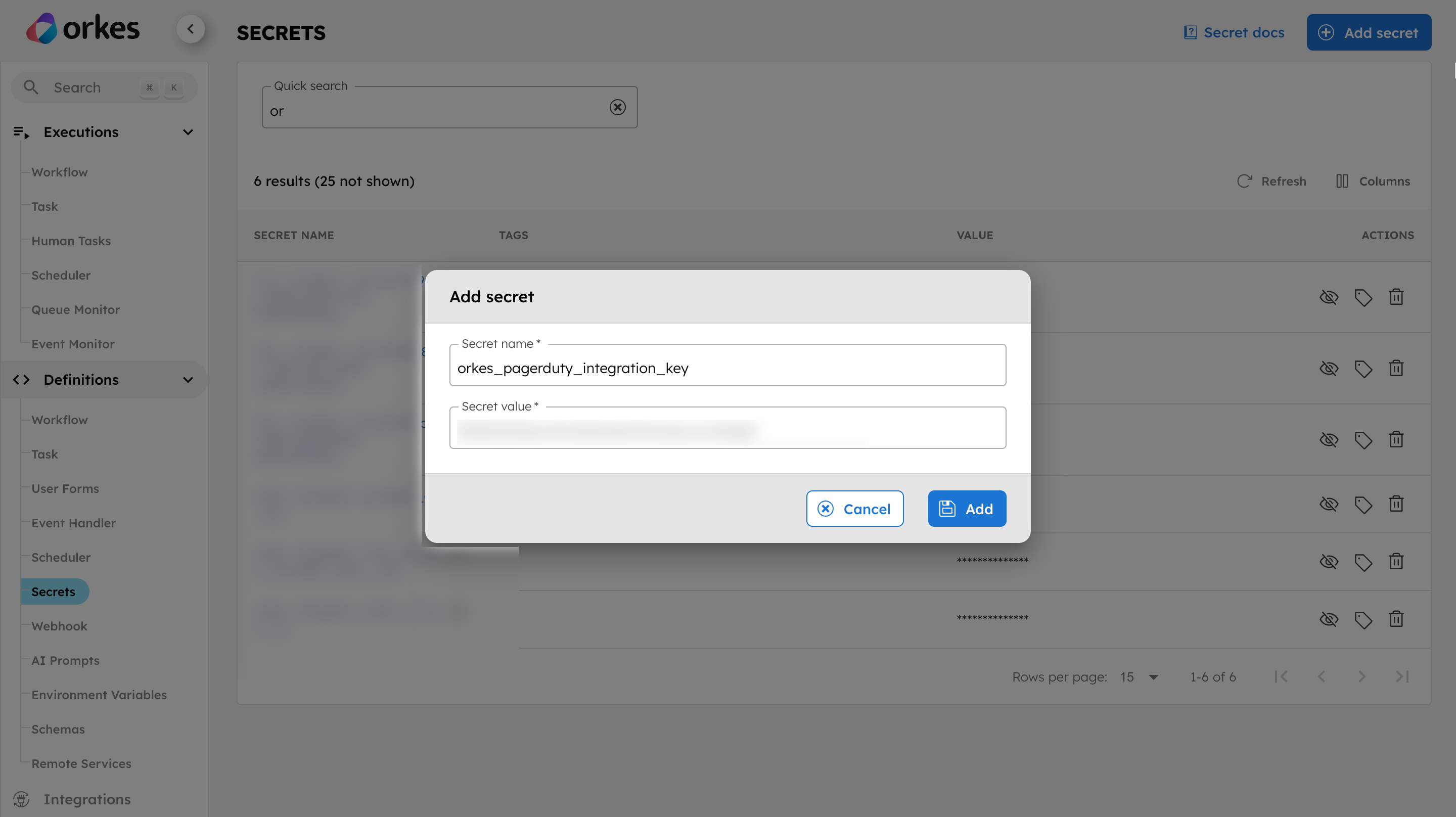
- Select Add.
The secret is referenced in the workflow as ${workflow.secrets.orkes_pagerduty_integration_key}.
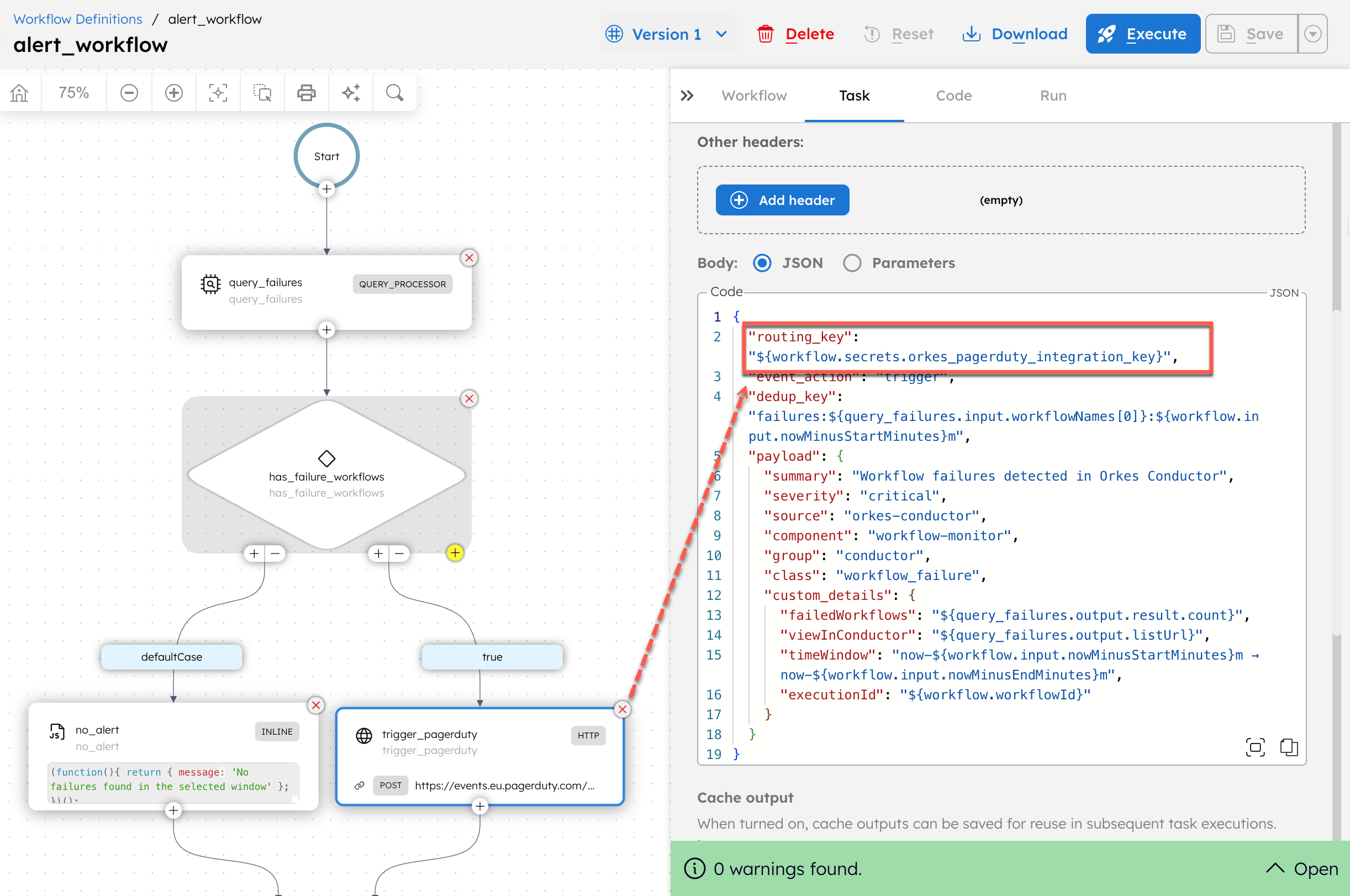
Step 5: Modify workflow
Next, modify the workflow to suit your requirements.
Open the alert_workflow definition. In the trigger_pagerduty task, replace the <PAGERDUTY-URL> placeholder with the Integration URL you copied from PagerDuty.
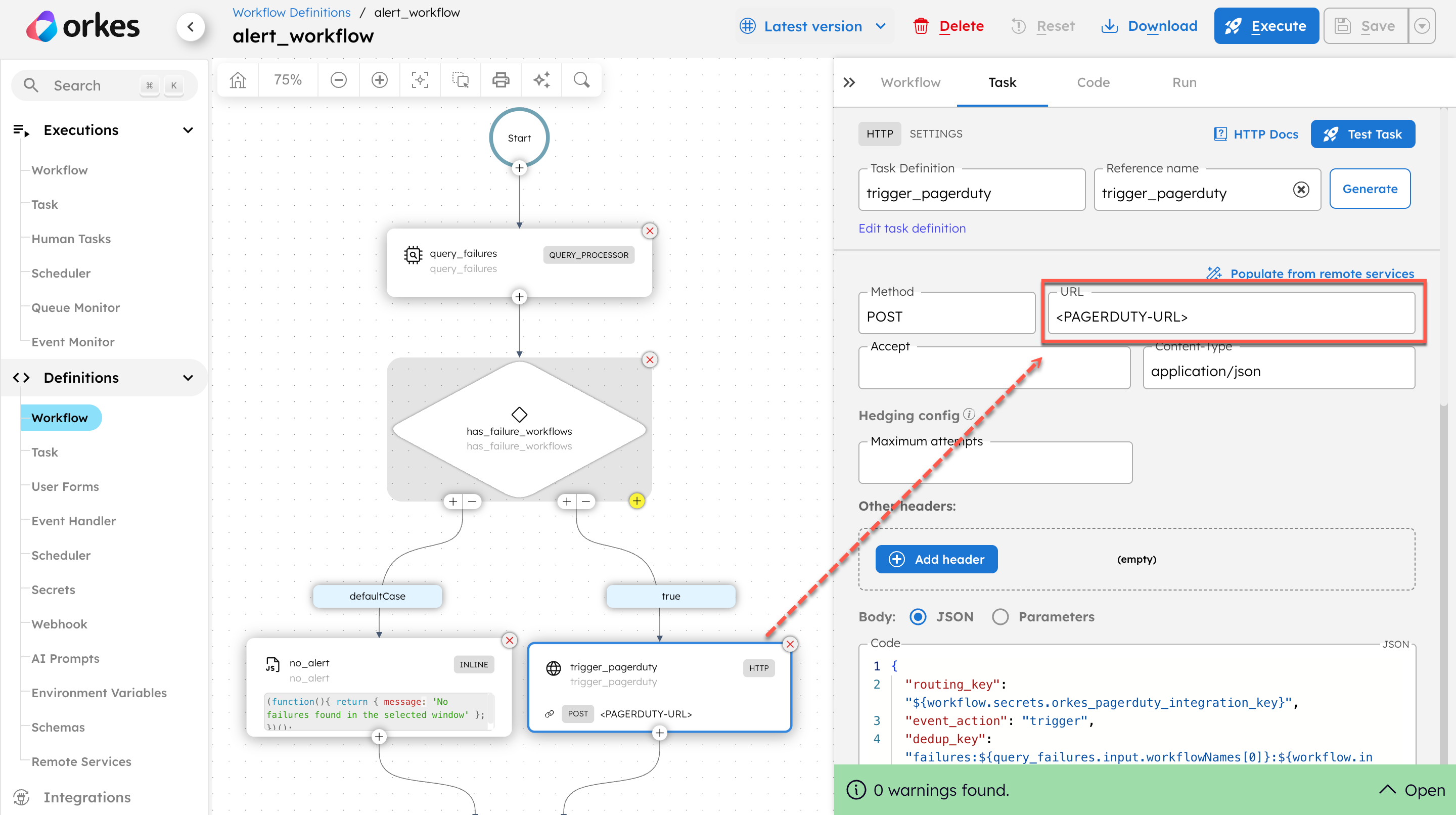
Save the workflow.
Step 6: Execute workflow
We will run the workflow that checks for the failed status of the seed_failure workflow.
To test the workflow:
- From your workflow definition, go to the Run tab.
- Set the input parameter. For example, let’s fetch the failure workflow in the last 60 minutes:
{
"nowMinusStartMinutes": "60",
"nowMinusEndMinutes": "0"
}
- Select Execute.
Since the workflow has no failures, it will complete without triggering an alert.
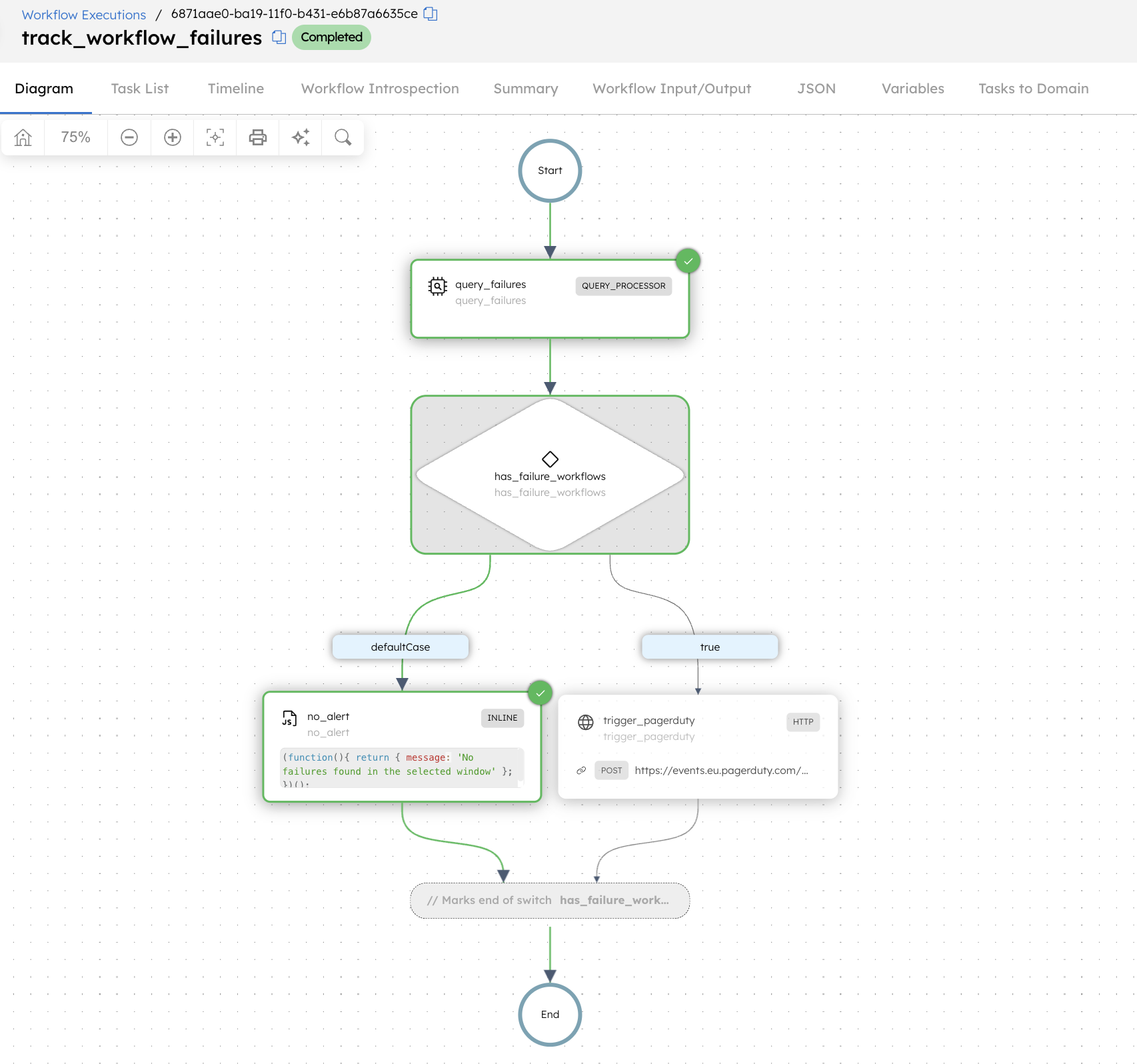
To simulate a failure, let’s run the seed_failure workflow to trigger failures.
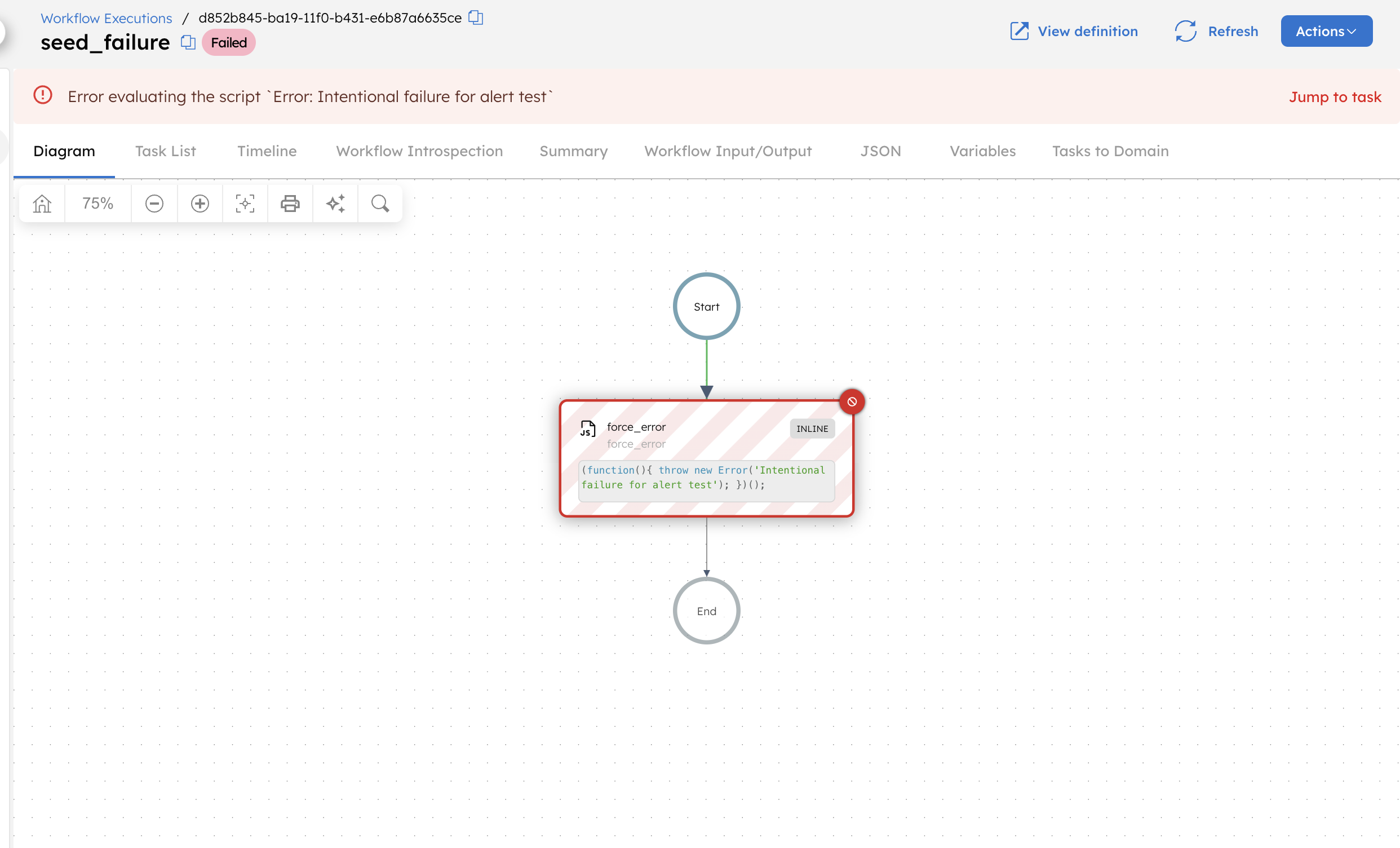
Re-run the alert_workflow. This time, the workflow detects the failed run and triggers a PagerDuty alert.
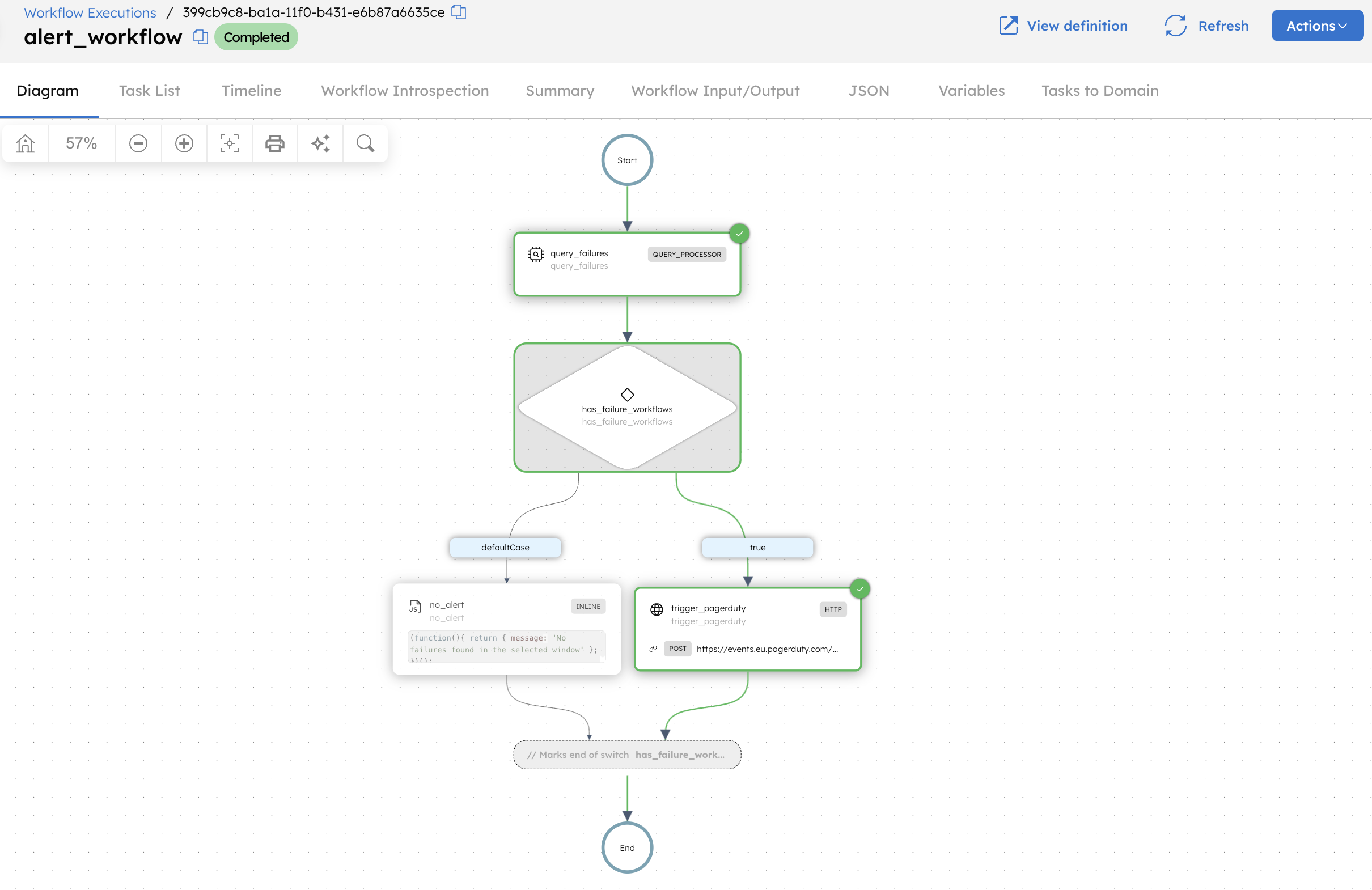
Open PagerDuty and go to Incidents to view the alert received.
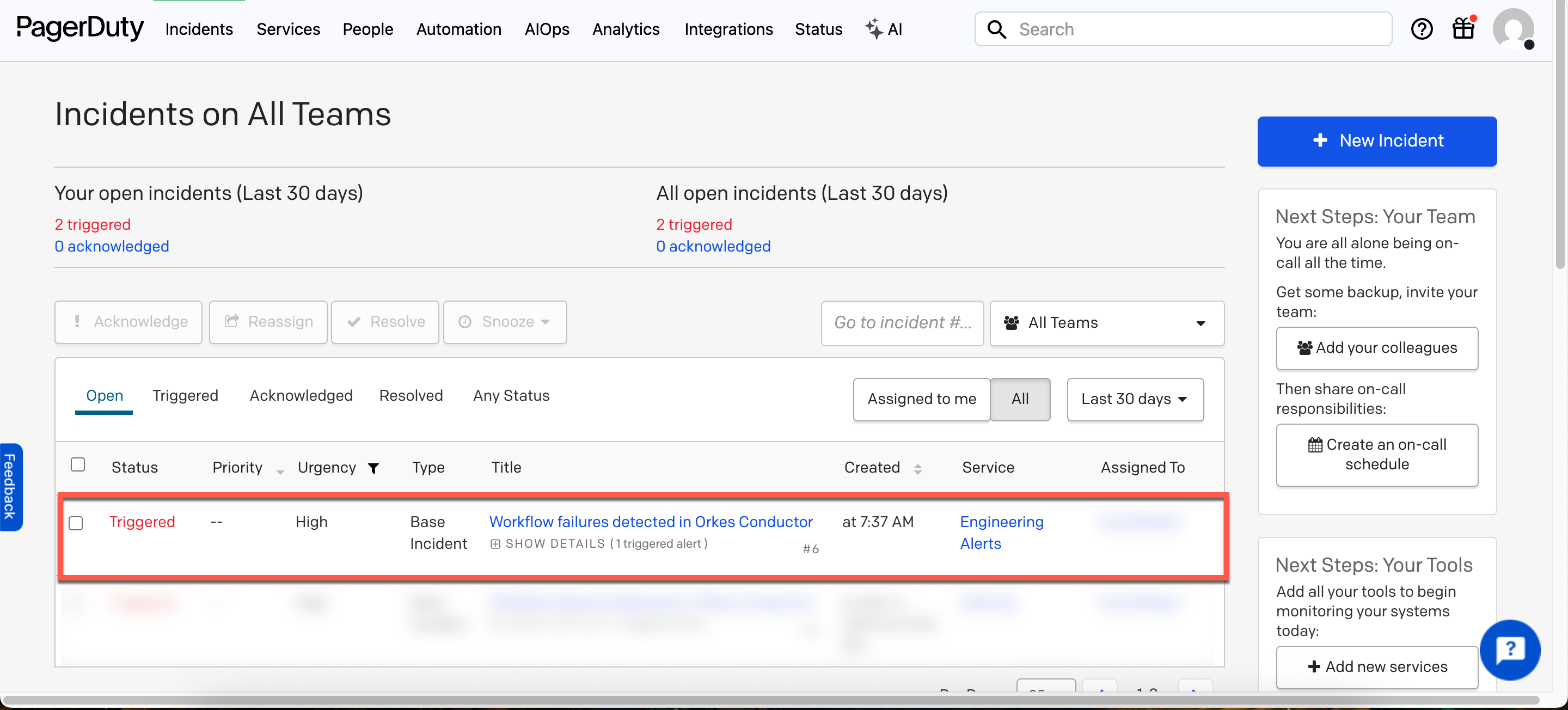
Workflow modifications
This alerting workflow can be extended by:
- Adding an HTTP request to fetch failures from other endpoints.
- Adding multiple alerting channels, such as Slack or email.
- Monitoring various workflows in the same query.
- Adding retry or escalation logic for failed alerts.
- Preventing duplicate alerts within a specific timeframe.
- Generate periodic reports of workflow failures.